#zyriab the singer of baghdad
Explore tagged Tumblr posts
Text
7th part of the bookscans of Al Andalus. Historical Figures, here's the previous part
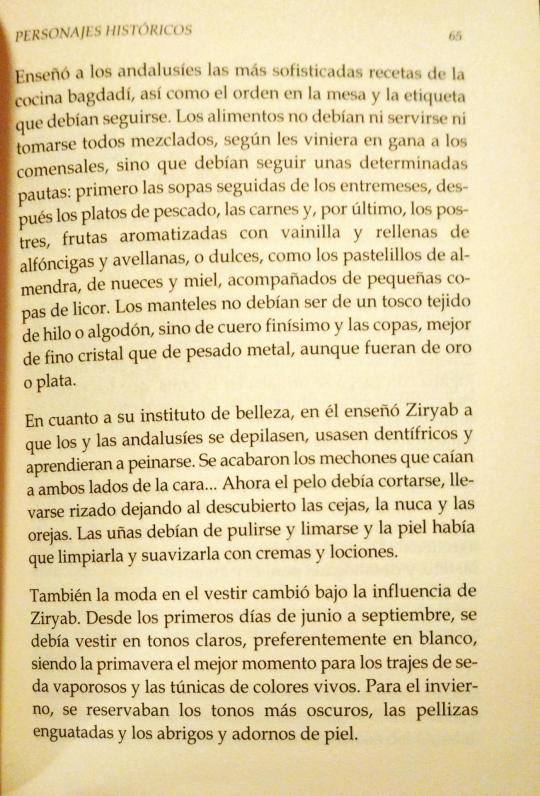
He taught the Andalusians the most sophisticated recipes of Baghdad cuisine, as well as the order at the table and the etiquette that had to be followed. The food should not even served or taken all mixed, as the diners wanted, but they had to follow certain guidelines: first the soups followed by the hors d'oeuvres, then the fish dishes, the meats and, finally, the desserts, fruits flavored with vanilla and stuffed with alphoncigas and hazelnuts, or sweets, such as almond, walnut and honey pastries, accompanied by small glasses of liquor. The tablecloths should not be of a coarse woven linen or cotton,nbut of very fine leather and the cups, better of fine crystal than of heavy metal, even if they were gold or silver.
As for his beauty institute, Ziryab taught the Andalusian to shave their hair, use toothpaste and to comb their hair. The strands that fell on both sides of the face ended... Now the hair had to be cut, worn curly, revealing the eyebrows, the nape of the neck and the ears. Nails should be polished and filed and the skin had to be cleaned and softened with creams and lotions.
Fashion in clothing also changed under the influence of Ziryab. Since the first days from June to September, they had to dress in light colors, preferably in white, spring being the best time for suits of gauzy silk and brightly colored tunics. For winter, they reserved the darker tones, the quilted pelisses and the fur coats and decorations.
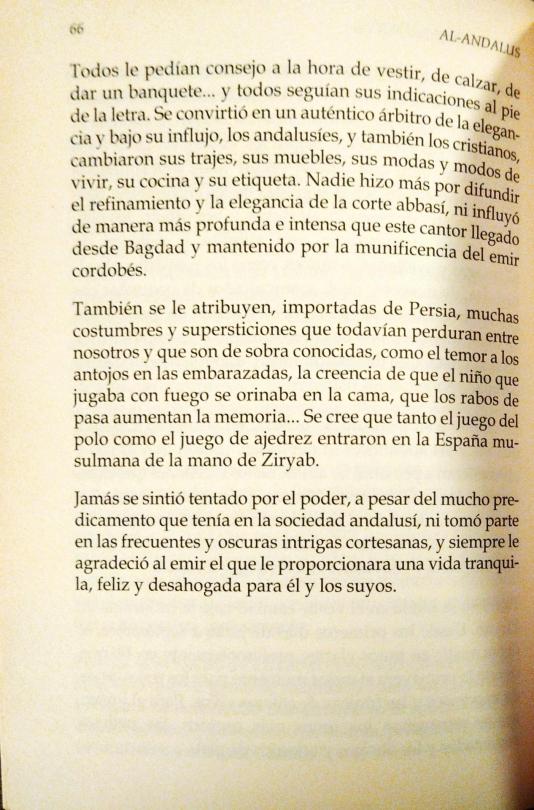
Everyone asked him for advice when it came to dressing, fitting shoes, giving a banquet... and everyone followed his instructions fully. It became a real arbiter of elegance and under his influence, the Andalusians, and also the Christians, changed their clothes, their furniture, their fashions and ways of living, their kitchen and their etiquette. No one did more to spread refinement and elegance of the Abbasid court, nor did he influence in a more profound and intense way than this singer arrived from Baghdad and maintained by the munificence of the Emir of Córdoba.
Also attributed to him, imported from Persia, are many customs and superstitions that still exist among us and that are too known, such as the fear of cravings in pregnant women, the belief thatbthe boy who played with fire wet the bed, the tails of raisin increase memory... It is believed that both the game of polo and the game of chess entered Muslim Spain at the hands of Ziryab.
He never felt tempted by power, despite the much premedication that he had in Andalusian society, nor did he take part in the frequent and dark courtesans intrigues, and he always thanked the emir for providing him with a better, calm, happy and comfortable life for him and his people.
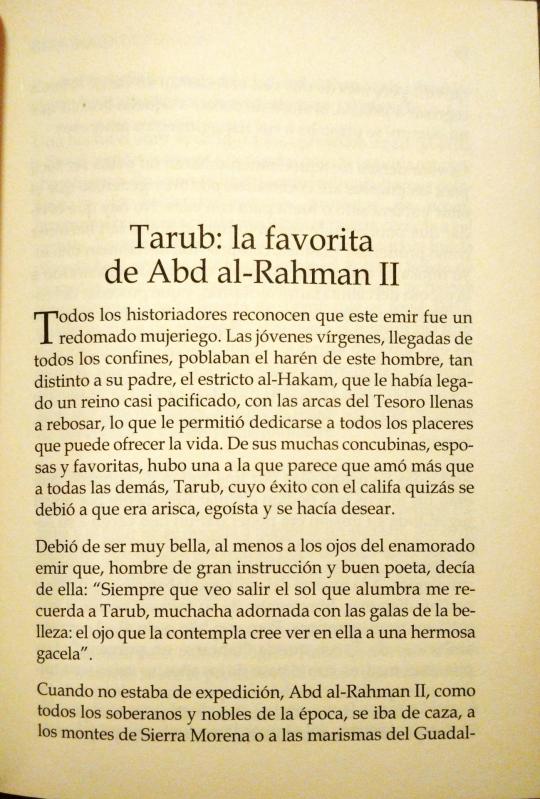
Tarub: the favorite of Abd al-Rahman II
All historians recognize that this emir was a complete womanizer. The young virgins, arriving from all corners, populated the harem of this man, so different from his father, the strict al-Hakam, who had bequeathed him a kingdom almost pacified, with the Treasury coffers filled to overflowing, which allowed him dedicate to all the pleasures that life can offer. Of his many concubines, wives and favorites, there was one whom it seems he loved more than all the others, Tarub, whose success with the caliph was perhaps due to her being surly, selfish and desired.
She must have been very beautiful, at least in the eyes of the enamored emir who, a man of great education and good poet, said of her: "Whenever I see the sun rise that illuminates reminds me of Tarub, a girl adorned with the trappings of beauty: "The eye that contemplates it believes it sees a beautiful gazelle in it".
When he was not on an expedition, Abd al-Rahman II, like all sovereigns and nobles of the era, went hunting, to the mountains of Sierra Morena or to the marshes of the Guadal-
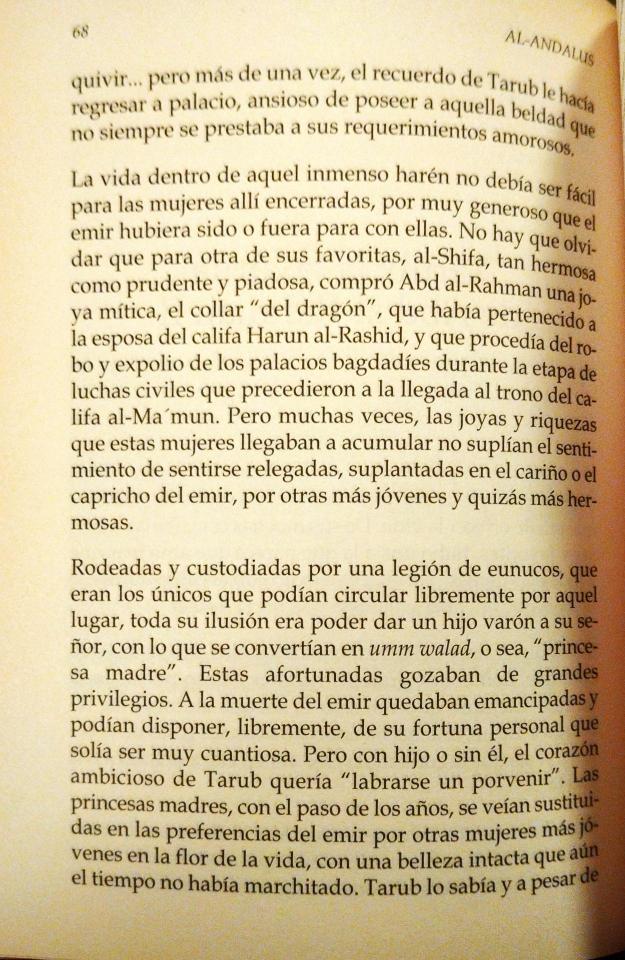
quivir... but more than once, the memory of Tarub made him return to the palace, eager to possess that beauty who did not always respond to his amorous requirements.
Life inside that immense harem it couldn't have been easy for the women locked up there no matter how generous the emir had been or was towards them. There is no need to forget that for another of his favorites, al-Shifa, as beautiful as prudent and pious, Abd al-Rahman bought a mythical jewel, the dragon necklace, which had belonged to the wife of the caliph Harun al-Rashid, and that it came from the robbery and looting of the badgadi palaces during the period of the civil struggles that preceded the accession to the throne of the caliph al-Ma'mun. But many times, the jewels and riches that these women accumulated did not make up for the feeling of feeling relegated, supplanted in the affection or whim of the emir, by others younger and perhaps more beautiful.
Surrounded and guarded by a legion of eunuchs, who were the only ones who could move freely through that place, their whole dream was to be able to give a male child to their lord, with which they became umm walad, that is, "princess mother." These lucky ones enjoyed great privileges. To the death of the emir were emancipated and could freely dispose of her personal fortune that used to be very large. But with or without a child, the ambitious heart of Tarub wanted to “make a future for herself.” The princesses mothers, as the years went by, saw themselves replaced in the prime of life, with an intact beauty that time had not yet withered. Tarub knew it and despite
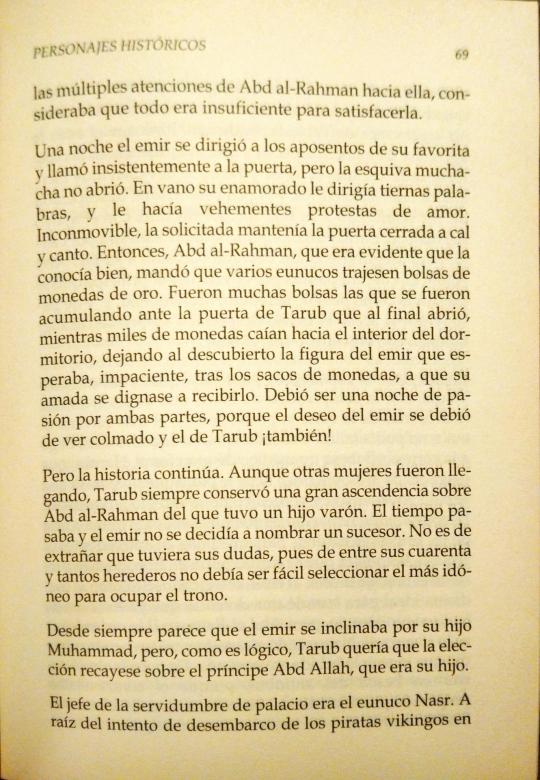
Abd al-Rahman's multiple attentions towards her, she considered that everything was insufficient to satisfy it.
One night the emir went to his favorite's chambers and called insistently at the door, but the elusive girl did not open it. In vain her lover spoke tender words to her, and made vehement protests of love. Unmovable, the requested one kept the door firmly closed. Then Abd al-Rahman, who clearly knew her well, ordered that several eunuchs carried bags of gold coins. There were many bags that were accumulating before the gate of Tarub that he finally opened, while thousands of coins fell into the bedroom, exposing the figure of the emir who waited, impatiently, behind the bags of coins, for his beloved would deign to receive him. It must have been a night of passion for both of us. parts, because the emir's wish must have been fulfilled and Tarub's too!
But the story continues. Although other women arrived, Tarub always retained a great ancestry over Abd al-Rahman from whom he had a son. Time passed and the emir could not decide to name a successor. It is not surprising that he had his doubts, since among his forty heirs it couldn't be easy to select the most suitable one to occupy the throne.
It always seems that the emir was inclined towards his son Muhammad, but, of course, Tarub wanted the choice to fall to Prince Abd Allah, who was her son.
The head of the palace servants was the eunuch Nasr. Following the attempt to landing of the viking pirates in
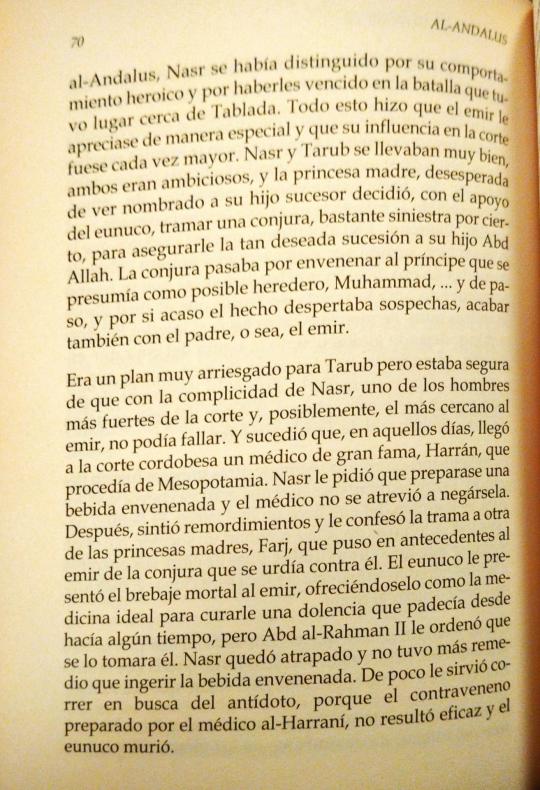
al-Andalus, Nasr had distinguished himself by his heroic behavior and by having defeated them in the battle that took place near Tablada. All this did that the emir appreciated him in a special way and that his influence at court was increasingly greater. Nasr and Tarub got along very well, they were both ambitious, and the princess mother, desperate to see her son named successor decided, with the support of the eunuch, to plot a plot, quite sinister indeed, to ensure the much-desired succession to his son Abd Allah. The plot involved poisoning the prince who was presumed to be possible heir, Muhammad,... and by the way, and just in case the fact aroused suspicion, also ending the father, that is, the emir.
It was a very risky plan for Tarub but she was sure that with the complicity of Nasr, one of the strongest men at court and, possibly the closest to the emir, she could not fail. And it happened that, in those days, a very famous doctor, Harrán, arrived at the Cordoban court, who came from Mesopotamia. Nasr asked him to prepare a drink poisoned and the doctor did not dare to deny him. Afterwards, he felt remorse and confessed the plot to another of the princess mothers, Farj, who informed the emir of the conspiracy that was being hatched against him. The eunuch presented the deadly concoction to the emir, offering it to him as the ideal medicine to cure an ailment that he had been suffering from for some time, but Abd al-Rahman II ordered him to take it himself. Nasr was trapped and had no more remedy than drinking the poisoned drink. It was of little use to him to run in searchbof the antidote, because the counterpoison prepared by the doctor al-Harraní, wasn't effective and the eunuch died.
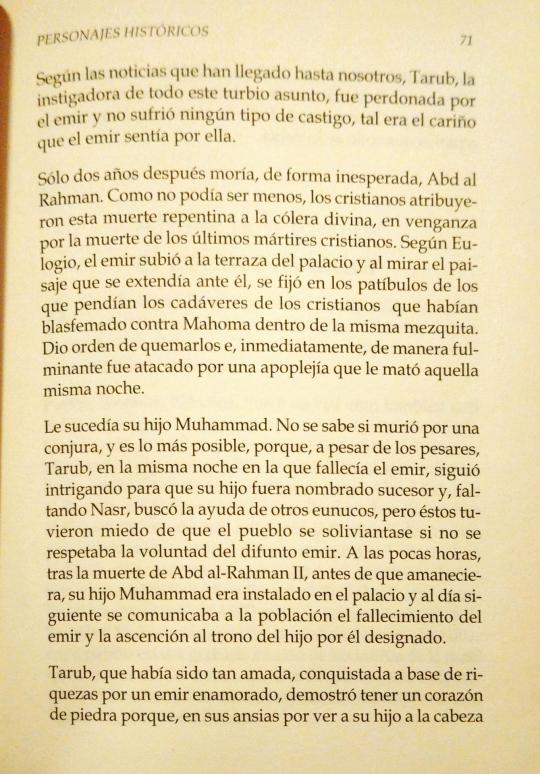
According to the news that has reached us, Tarub, the instigator of all this murky affair, was forgiven by the emir and did not suffer any type of punishment, such was the affection that the emir felt for her.
Only two years later, Abd al Rahman died, unexpectedly. The Christians attributed this sudden death to divine anger, in revenge for the death of the last Christian martyrs. According to Eulogio, the emir went up to the terrace of the palace and, looking at the landscape that stretched before him, noticed the scaffolds from which hung the corpses of the Christians who had blasphemed against Muhammad within the same mosque. He gave the order to burn them and, immediately, in a sudden manner, he was attacked by an apoplexy that killed that same night.
He was succeeded by his son Muhammad. It is not known if he died as a result of a conspiracy, and it is the most possible, because, despite the regrets, Tarub, on the same night in which the emir, continued to intrigue so that his son would be named successor and, with Nasr missing, she sought the help of other eunuchs, but they were afraid that the people would became angry if the will of the late emir was not respected. A few hours after the death of Abd al-Rahman II, before dawn, his son Muhammad wasinstalled in the palace and the next day the population was informed of the death of the emir and the ascension to the throne of the son designated by him.
Tarub, who had been so loved, conquered with wealth by an emir in love, proved to have a heart of stone because, in her eagerness to see his son in the lead
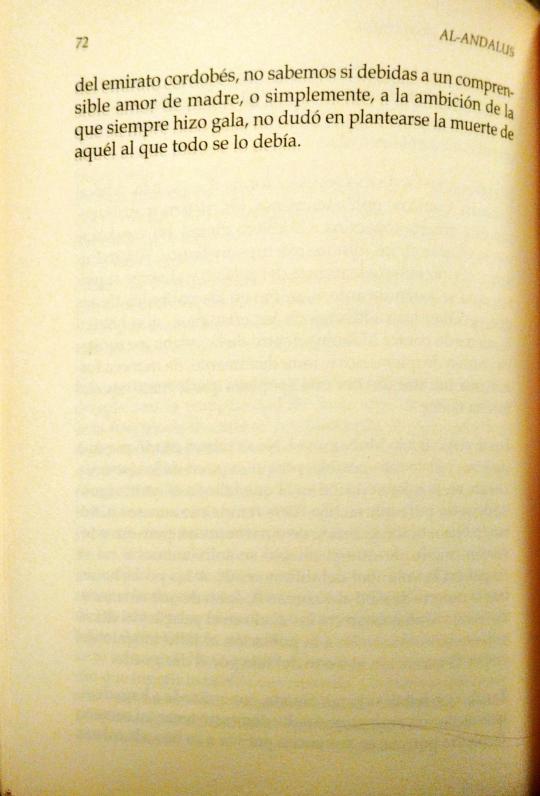
of the emirate of Cordoba, we do not know if due to an understandable love as a mother, or simply, to the ambition that she always displayed, she did not hesitate to consider the death of the one to whom she owed everything.

Abbas ben Firnas: the first aviator
Abd al-Rahman II was, without a doubt, the most cultured of all the emirs and Hispano-Umayyad caliphs. Only one of his descendants, al-Hakam II, could compare him in terms of intellectual curiosity.
Poets, writers, philosophers, who in turn were also almost all astrologers, to whom which the Muslims attached so much importance, were part of the court by Abd al-Rahman. We will mention some of them, of great talent, who excelled in different areas of knowledge, such as Abd Allah ben al-Shamir, magnificent versifier; Ibrahim ben Sulayman al-Shamí, whose religious and mystical poems achieved great relevance throughout the Muslim world; Uthman ben al-Muthanna, grammarian, who became a preceptor to the royal princes; Said ben Farach al-Rashshash, who knew more than 4,000 mnemonics poems by heart and his brother Muhammad, who established the measurement of the Andalusian cubit, whose pattern was engraved on one of the walls of the main mosque from Córdoba... The list of wise men would be very long. But among all of them the figure of Abbas ben Firnas is especially important.
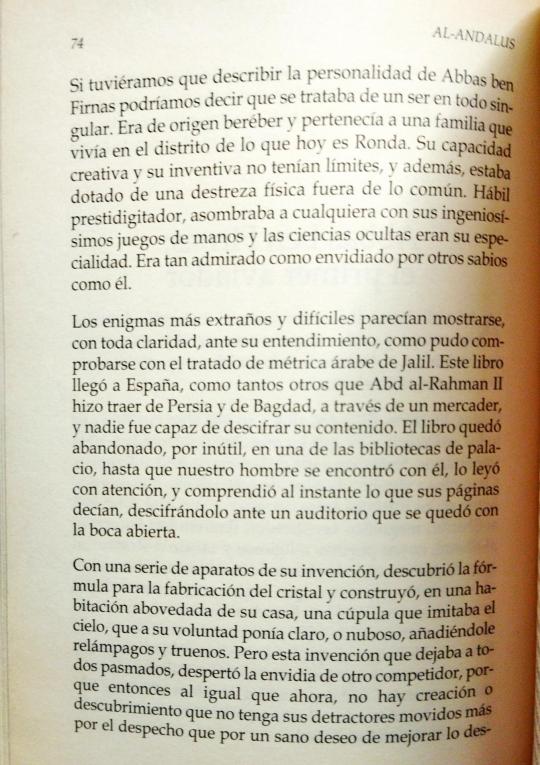
If we had to describe the personality of Abbas ben Firnas we could say that it was a being in every way singular. He was of Berber origin and belonged to a family that lived in the district of what is now Ronda. His creative ability and his inventiveness had no limits, and in addition, he was endowed with physical dexterity out of the ordinary. Skilled conjurer, he amazed anyone with his ingenious sleight of hand and occult sciences were his specialty. Was as admired as envied by other wise men like him. The strangest and most difficult enigmas seemed to show themselves, with complete clarity, before their understanding, as could be verified with the treatise on Arabic metrics of Jalil. This book arrived in Spain, like so many others that Abd al-Rahman II had brought from Persia and Baghdad, through a merchant, and no one was able to decipher his content. The book was abandoned, as useless, in one of the libraries of palace, until our man came across it, read it carefully, and instantly understood what its pages said, deciphering it before a audience that was left with their mouths open.
With a series of devices of his invention, he discovered the formula for the manufacturing glass and built, in a vaulted room in his house, a dome that imitated the sky, which at will made it clear or cloudy, adding lightning and thunder. But this invention that left everyone stunned, aroused the envy of another competitor, because then just as that now, there is no creation or discovery that does not have its detractors, motivated more by spite than by a healthy desire to improve what was
#al andalus historical figures#al andalus personajes históricos#book scans#bookblr#historyblr#al andalus#al andalus history#ziryab#zyriab the singer of baghdad#abu l-hasan ali ibn nafi`#abd al rahman ii#abd al rahman ii of córdoba#tarub#abbás ibn firnás#emirate of cordoba#spanish history#tw death#tw mysoginy#(for tarub's chapter)
14 notes
·
View notes
Text
6th part of the bookscans of Al Andalus. Historical Figures, here's the previous part

The following year a very serious incident occurred in the suburb, and according to custom, al-Hakam acted summarily, executing all possible guilty suspects through the infamous crucifixion.
As if that were not enough, the mood of the population in general, an increase in the taxes that, on top of that, a Christian, the so-called Count Rabi, collected, ended up for exasperating everyone. And the spark of rebellion broke out over an apparently trivial matter, as happens on so many occasions. A soldier of the guard emir had his sword polished and it seemed to him that the swordsmith in the suburb did not attend to him with sufficient alacrity, so he killed him by piercing him with his sword in question. Al-Hakam was hunting outside Cordoba and upon returning, passing through the conflictive neighborhood, was booed. His guard arrested ten rioters and, without mercy, they were immediately crucified. The emir had barely arrived at his palace when the entire suburb was up in arms. Businesses were closed and the tents, and with sticks, stones, knives, and everything they had within their reach, artisans, merchants, and the general public headed to the doors of the Alcázar with threatening intentions and the design of demolishing them.
In those moments of anguish in the Alcázar, when his fate presented itself doubtful in the face of those angry mobs, only al-Hakam seemed to retain the calm. He asked his Christian page to fetch a jar of civet and with it he perfumed his hair and beard. The page asked him, astonished, how in those serious moments he could think of putting on perfume as if he were going to court a woman and the emir replied that he did it so that when the popu-

lace cut off his head to know that it was really the head of their prince and not that of any other. Measures were taken with all the speed that the committed moment required. The troops loyal to the emir ensured order in the city and the palace butler and his secretary gathered all the available forces to try to contain the rapidly advancing mobs that were leaving uniting more and more people. The emir's troops were beginning to falter in the face of what seemed an unstoppable force of the mutineers, until two of the generals from al-Hakam they managed to reach the first houses in the suburb. Then its inhabitants found themselves surrounded. The two exits of the neighborhood were taken by loyal to the emiral cause. The rout began... and the slaughter.
Al-Hakam gave orders that no mercy be shown to the rioters and for three the looting and massacre continued, and no one knows what it could had happened if the minister Ibn Mugith did not advise the emir to cease in that horrible carnage. The suburb was closed so that no one could leave there until al-Hakam passed sentence or thought about what to do with the rebel subjects. The solution was still terrible, as terrible as three hundred notables of the suburb would be crucified and the rest of the inhabitants who had survived would preserve their lives in exchange for immediately abandoning Córdoba. The suburb would be completely demolished, plowed and planted so that no one could build a house or a habitation there. None of al-Hakam's successors dared, until the end of the 10th century, to contravene that now distant prohibition dictated by the emir and the suburb remained, for

a long time, like a desolate and dead place in which it seemed impossible there would have been so much life.
The inhabitants of the suburb, "rabadis" as they would be known, had to abandon house, business and city in the first fortnight of April 818. Only the fuqahāʾ and their families were freed from this expulsion, much to the dismay of al-Hakam, knowing as he knew that if they had not been the direct instigators of the rebellion, they encouraged it and did nothing to calm things down. It is not well known how many people were banished from the suburb, it is believed that perhaps there were about 20,000, since it was a very populous neighborhood, although the figure may have been a bit exaggerated. And there begins the odyssey of the “rabadis”, who showed themselves to be accomplished adventurers, forced, no doubt, by the need.
Some went to take refuge in Toledo, a city always willing to welcome to all those who showed themselves against the central power. But they feared that the anger of that vengeful emir reached them, so they decided to flee further away, as far as to cross the sea. The Rabadis, with their families, left towards the Mediterranean coast, not without suffering the assault of the unscrupulous in their modest convoys in which they carried the few belongings they saved from the merciless looting to which they had already been subjected. Some went to North Africa and settled among the Berber tribes. In this region there were few cities and Prince Idris II was looking for inhabitants who could populate the city of Fez that their father had founded. It would not

take much time to increase this population with a new city, very close to the one that already existed and spread the word that everyone who came to populate both cities would be welcomed with open arms. Many Rabadis, with their families, moved there and very soon the new foundation of Idris II was known as Madinat al-Andalusiyyin, the “City of the Andalusians”. To this city they took the rabadis their knowledge of gardening and agriculture, crafts and architecture, as well as as their forms of citizen life. But this was not their greatest feat of those banished.
Part of them set out to sail the Mediterranean, dedicating themselves to privateering and piracy to survive. Although the Rabadis were not sailors, it is very possible that they they were accompanied by Valencian or Andalusian sailors, muladíes most likely, and that together they would undertake that adventure.
One day they docked in front of beautiful Alexandria, in those days subjected to fighting, that were taking place throughout Egypt, among the governors appointed by the caliph. The Rabadis became strong in the city and with the help of a faction Arab, the Lajmis, and the followers of a puritan Islam, created a kind of independent republic that they would maintain for more than ten years.
In vain the inhabitants of Alexandria tried, on more than one occasion, to get rid of these upstarts who had become masters of their city. Finally, in May 827, the governor Abd Allah ben Tahir, besieged them and after several days of siege, the Rabadides surrendered. They were allowed to go, but

they could not take any of their slaves and had to compromise that they would not dock in any port that was in Abbasid territory.
Thus they found themselves expelled from Egypt, as they had already been expelled from Córdoba, and they began the journey again, this time heading towards the island of Crete, which belonged to the Byzantine Empire. In command of that expedition that sought a place to settle, there was a man from Córdoba from Llano de los Pedroches, called Abu Hafs Umar al-Balluti. They landed on the island and occupied it in their whole. Abu Hafs al-Balluti founded a dynasty there that remained on the island for one hundred and thirty-four years, until the year 961.
They repelled incessant Byzantine attacks that wanted to recover Crete, until that the general Nikephoros Phocas managed to recapture the island for the Byzantine emperor Roman II.
Back at sea, those already distant Andalusians, for more than a century and medium, frightened the entire navigation of the central and eastern Mediterranean, also acting with great audacity in the Aegean islands.

Ziryab: the singer of Baghdad
A somewhat peculiar character from Muslim Spain was Ziryab, although he wasn't a politician, nor a religious person, nor a warrior, he was going to have a capital influence on the Andalusian society, creating fashions and implementing customs and ways of life that ended up adopting Moors and Christians, and that would remain until our days.
Ziryab was called that because he had very dark skin and he was given this nickname in reference to the black plumage of a bird, the blackbird, but its real name was Abu-l-Hasan Ali ben Nafi. He was born in Mesopotamia and was a freedman of the Abbasid caliph al-Mahdi. From a very young age he showed to be gifted, in a privileged way, for singing and was a disciple of another celebrity in the field of music, the singer of the Baghdad court, Ishaq al-Mawsilí. Very soon he became so famous that the Great Caliph Harun al-Rashid asked the teacher to bring his disciple to court to hear him sing.
There are many legends about this performance. One of the best known is the that Ziryab, before the caliph, very sure of himself, told him that he knew how to sing what other great singers knew but, who also sang, what no one knew sing. If the caliph so desired, he would put in his ears

a music and a song that no one had heard before. Harun al-Rashid was surprised and intrigued and wanted me to act for him, interpreting those unknown melodies.
It is said that Ziryab did not use the traditional lute as accompaniment, but who used an instrument of his invention. It was a kind of five-string guitar, the first, the third and the fifth were made with lion's guts; the second and fourth were made of red silk. To press them, instead of the typical pick of wood, he used the claw of an eagle.
Harun-al Rashid was fascinated by what he heard and told the singer that he returned the next day to perform, again, for him. But Ziryab didn't returned to the palace in Baghdad. What had happened for the musician to not coming back? Well, his master felt deep envy of the success of his disciple. He understood that he was going to take away his place as a favorite singer in the court and threatened to kill him. Ziryab, fearing for his life, decided to leave from Baghdad as soon as possible
The sad days of exile as a traveling musician began for him. For some time he lived in Cairo, crossed the deserts of Egypt and Libya and he settled in Qayrawan, a city that had nothing to do with the splendor of Baghdad or the refined Córdoba. But wherever he went, those who heard him singing could never forget the timbre of his voice and the harmony of his compositions. And so it was that through another musician, less jealous than his mas-

ter!, the Cordoban Jew Abu-l-Nasr Mansur, reached the ears of al-Hakam I the mastery of Ziryab and sent for him. Al-Hakam I, like all the emirs and, later, Andalusian caliphs, was a great lover of music and poetry and himself a notable poet. Ziryab embarked immediately to Algeciras. There, as soon as he disembarked, he received news that the emir had just died and became disheartened, thinking that his good luck was ending. But Abd al-Rahman II, son and successor of al-Hakam, let him know that he maintained the contract that his father had offered him and sent him gifts of such magnificence that the singer was clear that he would remain in al-Andalus forever. The emir received him with the greatest attention and not only that: he assigned him a fabulous pension for the time, 200 gold dinars a month, in addition to providing him with a house and servitude, giving him some land in the countryside of Córdoba, which was very productive, and complete his offering with two hundred sextars of barley and one hundred of wheat to maintain his house and his family. There was not in all Muslim world another poet, musician, singer or scholar who was better paid than Ziryab, and the splendid remunerations of which he was the object, extended, even further, his fame everywhere. In truth it must have been an exceptional being for the emir treated him with such kindness!
But to better understand the generosity of Abd al-Rahman II it is interesting to know something about what his life and his court were like, in which he adopted all the royal forms of the Court of the Abbasids. His father had left him the Treasury coffers completely packed, which allowed the new emir to dedicate

to acquire the most precious merchandise that arrived to Córdoba brought by Jewish, Slavic and Iraqi merchants.
Abd al-Rahman II was an unrepentant lover and admirer of women. Of all Europe and also from the East, beautiful young women will arrive, always virgins to the harem of the emir, who is said to have had forty-five male children and forty-two daughters. Some of his many concubines managed to reach just fame for her beauty, careful education and talent. Such is the case of the three young people known as the “Medinese”, not because they were natives of this city, what's more, one of them was Spanish, but all three had been educated in a perfect Arab culture. They were magnificent singers, versifiers and experts in Medinese music and entertained the leisure of their lord who appreciated them in such a way. So for them he had a special pavilion built inside the Alcázar.
A man like the emir, lover of all pleasures, both the sensual ones like intellectuals, it was not surprising that he appreciated moving art and only one of Ziryab, who arrived in al-Andalus in the year 822, with four children who, with over time, they would continue his work, and he stayed until his death in 857. In these thirty-five years the emir and he always maintained cordial relations and they appreciated and respected each other.
But Ziryab's activities were not only limited to music, but his genius manifested as a profound innovator of the Muslim society of the time. He created a conservatory... and a beauty institute, because Ziryab was a true and refined dandy.
#al andalus. historical figures#al andalus. personajes históricos#book scans#al andalus#historyblr#bookblr#al andalus history#spanish history#rabadies#rabadid dinasty#al hakam i#al hakam i of córdoba#emirate of cordoba#emirate of crete#abu hafs al-balluti#abd al rahman ii#abd al rahman ii of córdoba#zyriab#abu-l-hasan ali ibn nafi#zyriab the singer of baghdad#al-balluti
7 notes
·
View notes